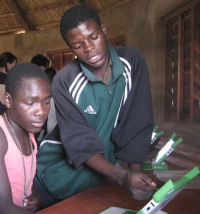My friend Ellie Tomlinson and I introduced ten XO laptops at the first Lubuto Library in Lusaka, Zambia in February, 2009, during our school's two-week winter internship. We went to Zambia with very little of an idea of what we were going to do when we got there.
We knew that our mission was to introduce these nifty little OLPC laptops to the children at the Lubuto library, and we knew that the outcome of this experiment was unpredictable.
Because of this unpredictability, we prepared ourselves for this experience by familiarizing ourselves with the laptops, and worked with some other Lubuto volunteers to try and create a user-friendly manual for them. Other than that, we knew that we would have to improvise as soon as we set foot in the Lubuto Library.
As it turned out, we ended up having no use for the manuals whatsoever. All of the technical lingo and jargon that has become part of the daily routine of the average American was foreign and, probably, outright bizarre to some of the children at the library in Lusaka (many of whom were still learning English, if learning at all.) Even the most basic ones, like "mouse" or "cursor," were incommunicable due to the now-obscure link that the actual English words had to the technology they accompanied.
Re-evaluating the situation, we realized that we should aim to simply show the kids how to use the machines, and let them discover the rest largely on their own (which was possible due to the image-oriented, intuitive, and user-friendly design of the XO software). So, when we demonstrated the laptops to the children, "mouse" and "cursor" became "arrow," "keyboard" became "letters," "click" became "push" or "press," etc.
Once these basic commands for manipulating the machines became clear to some of the children who had a decent or basic understanding of English, they were able to demonstrate it to the other children while translating what Ellie and I had said into other languages.
The most popular and successfully used applications were the most intuitive ones, such as "Record" (or any application that utilized the camera or microphone), the "Maze" game, the "Browse" application (due to the music that could be accessed from it) and the "Speak" application, which caused outbursts of delight from every child who heard their name pronounced phonetically by the silly, gray face on the screen.
Simple as they may be, these applications individually represent some of the most important functions that most computers are used for: writing, navigating an Internet browser, and recording and sharing their creativity; these applications collectively managed to introduce these vital computer skills to users who did not even speak the language that they were presented in.
Thanks to this intuitive nature of the XO laptops, all that was left for us to do was make sure that nobody damaged the computers or software, and to answer the occasional question; when we left, we came up with four basic rules that, if enforced, would ensure the longevity of the XO's, and, with the help of our friend and former street kid Kenny Hau, translated them into two additional languages. They were:
- wash your hands before using the laptops,
- only open one activity at a time (to avoid crashing),
- do not erase activities,
- and shut down through the main menu (rather than manually).
This was the way that Ellie and I found was most effective for integrating the XO laptops into the daily routine of the Lubuto library. Maintaining a rigorous structure and trying to teach overly-complicated tasks would simply not have been feasible for many reasons; I believe that (especially for young children) forcing kids to line up single-file and ignore their peers in favor of some talking, American head who they can barely understand is not the right approach.
The best approach is to take two minutes to give them the bare necessities, and then set them loose to do as they please with the curious machines in front of them. Not only does this allow for them learn at their own pace (and therefore more efficiently), communicate and share more with their peers, be more creative, and pursue what they find interesting most, but it also allows them to have fun.
For teachers, getting the subject that they are teaching their students to be fun should be the highest ideal possible, as it allows for the best learning experience; conveniently for teachers of computer literacy in third-world countries, they will find that teaching their subject using the OLPCs will be very easy.
Fun comes pre-packaged with these amazing little machines.
Henry Meyers introduced the One Laptop Per Child XO laptops at the first Lubuto Library in February.


